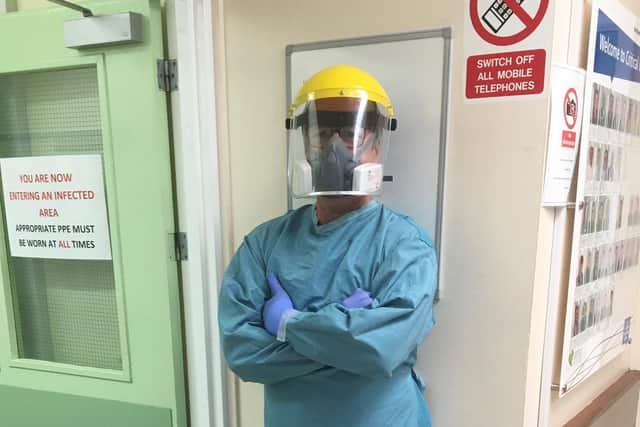Duty Calls: Northampton nurse who came out of retirement to fight pandemic shares reality of Covid
and live on Freeview channel 276
In a new series of interviews, the Chronicle & Echo will be talking to the front line staff of Northampton General Hospital who are fighting the pandemic amid the worst rate of infections and recorded deaths yet so far.
"People ask me if I feel angry at seeing people not wearing masks in shops, or saying all the wards are empty and Covid isn't real," says Intensive Care veteran Adrian Williams.
Advertisement
Hide AdAdvertisement
Hide Ad"And I've been angry in the past. I've gone ballistic in the past - but I don't have the energy to be angry anymore. It's energy better put towards doing something useful on the ward. We're just weary."


In the nine months since Adrian came out of retirement to return to work on Northampton's General's Intensive Therapy Unit, he's never seen his colleagues more exhausted.
He doesn't even have to be there. After serving as a Band 7 Charge Nurse in the ITU for 15 years, he retired in 2016. But when the pandemic flared up, he signed on to return to NGH as a healthcare assistant and throw himself back into his old life of 12-hour work shifts to save lives.
It's been like nothing he's ever seen.
"Some staff have seen more death this year than they would normally see in their whole careers," says Adrian.
Advertisement
Hide AdAdvertisement
Hide Ad"The support among staff and with each other is phenomenal. We all get up every day to help our patients, and the emotional support and wellbeing we all help each other with is amazing.
"But in every hospital anywhere, there's a finite resource, and you have to maximize what your resources can do - and that includes the people. We are in a position where you must, must get the most out of every person. And you're moving them about and giving them patients and physically and mentally taxing them - until they're stretched too far like a rubber band.
"You can train for a marathon and do it once. But when you're asked to run a marathon everyday, it will get to you. Healthcare staff are running a marathon every single day. And when every single day you know it's going to be that way, you ask how long can people cope?"
It's a frank and worrying admission to share. It's possible that healthcare staff are not having this conversation with each other because they are relying on one another to push through, although peer support and wellbeing checks have been promoted this year.
Advertisement
Hide AdAdvertisement
Hide AdAnd for all his wealth of experience Adrian has another thought about the toll of the last year.
"For all the ways staff are helping each other, I think there's going to be things later on down the line with PTSD - healthcare staff saying to themselves 'I could have done more, is there more I could have done?'"
And it's on this point Adrian makes it clear there is always something they can do to turn the tide.
"We don't want people's sympathy," he says. "We want people to adhere to the rules and get numbers down.
Advertisement
Hide AdAdvertisement
Hide Ad"What I want to say to everyone is 'it isn't over'. I'm not going to say to anyone anymore that 'it's just going to be like this for a few more months' because that can change. It's happened before.
"The evidence is there for what we need to do - stay at home, wash your hands, social distance, and get the vaccine.
"Even the vaccine isn't going to be the cure-all. It's going to be another help but that doesn't solve everything. It's only another weapon against it."
This isn't the only health crisis Adrian has seen in his 20 year career, and they all share one factor - fear of the unknown. He saw it when the discussion around HIV was led by rumour, and when the NHS had to prepare for the possibility of H1N1 and Ebola.
Advertisement
Hide AdAdvertisement
Hide AdEven when faced with fear of the unknown, infection control and the steps to protect people never change. But it is this pandemic that has him the most concerned for his colleagues.
"But the people I feel the most for are the relatives. They can't fill the role they want to play. They can't hold their loved one's hand and spend their last minutes with them.
"I say to all those people, that the amount of time you spend at their relative's bedside is no reflection of their love for them.
"In this strange, but familiar new environment, you come to terms with what you can and cannot achieve. But more importantly it’s your attitude which is the keystone. Enthusiasm and positivity, help for those who are struggling with the magnitude of the crisis."